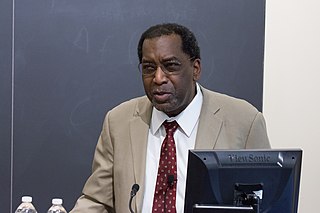
The civil rights movement was a social movement and campaign from 1954 to 1968 in the United States to abolish legalized racial segregation, discrimination, and disenfranchisement in the country. The movement had its origins in the Reconstruction era during the late 19th century and had its modern roots in the 1940s. After years of direct actions and grassroots protests, the movement made its largest legislative gains in the 1960s. The social movement's major nonviolent resistance and civil disobedience campaigns eventually secured new protections in federal law for the civil rights of all Americans. The social movement's span of time is called the civil rights era.
The Mississippi Freedom Democratic Party (MFDP), also referred to simply as the Freedom Democratic Party, was an American political party that existed in the state of Mississippi from 1964 to 1968 during the Civil Rights Movement. Created as the partisan political branch of the Freedom Democratic organization, the party was organized by African Americans and White Americans from Mississippi who were sympathetic to the Civil Rights Movement. The organization aimed to challenge the established power of the state Mississippi Democratic Party, which then opposed the Civil Rights Movement and only allowed participation by White Americans.

The Southern Christian Leadership Conference (SCLC) is an African-American civil rights organization based in Atlanta, Georgia. SCLC is closely associated with its first president, Martin Luther King Jr., who had a large role in the American civil rights movement.

Lamar "Ditney" Smith was an American civil rights figure, African-American farmer, World War I veteran and an organizer of voter registration for African-Americans. In 1955, he was shot dead in broad daylight around 10 a.m. at close range on the lawn of the Lincoln County courthouse in Brookhaven, Mississippi.

Fannie Lou Hamer was an American voting and women's rights activist, community organizer, and a leader in the civil rights movement. She was the vice-chair of the Freedom Democratic Party, which she represented at the 1964 Democratic National Convention. Hamer also organized Mississippi's Freedom Summer along with the Student Nonviolent Coordinating Committee (SNCC). She was also a co-founder of the National Women's Political Caucus, an organization created to recruit, train, and support women of all races who wish to seek election to government office.
Critical race theory (CRT) is an academic field focused on the relationships between social conceptions of race and ethnicity, social and political laws, and media. CRT also considers racism to be systemic in various laws and rules, not based only on individuals' prejudices. The word critical in the name is an academic reference to critical theory rather than criticizing or blaming individuals.
The Regional Council of Negro Leadership (RCNL) was a society in Mississippi founded by T. R. M. Howard in 1951 to promote a program of civil rights, self-help, and business ownership for African Americans. It pledged "to guide our people in their civic responsibilities regarding education, registration and voting, law enforcement, tax paying, the preservation of property, the value of saving and in all things which will make us stable, qualified conscientious citizens." Instead of starting from the "grass roots," however, the strategy was to "reach the masses through their chosen leaders" by harnessing the talents of blacks with a proven record in business, the professions, education, and the church.

Amzie Moore was an African-American civil rights leader and entrepreneur in the Mississippi Delta. He helped lead voter registration efforts. His former home is a Mississippi Landmark. A historical marker commemorates its history. It is now a museum and interpretive center.

Aaron Henry was an American civil rights leader, politician, and head of the Mississippi branch of the NAACP. He was one of the founders of the Mississippi Freedom Democratic Party which tried to seat their delegation at the 1964 Democratic National Convention.
The Council of Federated Organizations (COFO) was a coalition of the major Civil Rights Movement organizations operating in Mississippi. COFO was formed in 1961 to coordinate and unite voter registration and other civil rights activities in the state and oversee the distribution of funds from the Voter Education Project. It was instrumental in forming the Mississippi Freedom Democratic Party. COFO member organizations included the National Association for the Advancement of Colored People.

Charles M. Payne Jr. is an American academic whose areas of study include civil rights activism, urban education reform, social inequality, and modern African-American history. He was the Chief Education Officer for Chicago Public Schools and used to be the Frank P. Hixon Distinguished Service Professor at the University of Chicago's School of Social Service Administration.
John Dittmer is an American historian, and Professor Emeritus of DePauw University.
Jacqueline Anne Rouse (1950-2020) was an American scholar of African American women’s history. She is most widely known for her work on Southern black women and their activism from the turn of the twentieth century to the Civil Rights Movement.
Amber L. Hollibaugh was an American writer, filmmaker, activist and organizer concerned with working class, lesbian and feminist politics, especially around sexuality. She was a former Executive Director of Queers for Economic Justice and was Senior Activist Fellow Emerita at the Barnard Center for Research on Women. Hollibaugh proudly identified as a "lesbian sex radical, ex-hooker, incest survivor, gypsy child, poor-white-trash, high femme dyke."
Let the People Decide: Black Freedom and White Resistance Movements in Sunflower County, Mississippi, 1945–1986 is a 2004 book written by J. Todd Moye and published by the University of North Carolina Press.

The sit-in movement, sit-in campaign, or student sit-in movement, was a wave of sit-ins that followed the Greensboro sit-ins on February 1, 1960, led by students at North Carolina Agricultural and Technical Institute (A&T). The sit-in movement employed the tactic of nonviolent direct action and was a pivotal event during the Civil Rights Movement.

Dorie Ann Ladner was an American civil rights activist and social worker. Along with her sister Joyce, she was a leading community organizer in Mississippi for the National Association for the Advancement of Colored People (NAACP) and Student Nonviolent Coordinating Committee (SNCC) during the 1960s. She was a key organizer of the Freedom Summer Project, which promoted voter registration for African Americans in Mississippi. She participated in the March on Washington and the March from Selma to Montgomery.

Nancy K. MacLean is an American historian. She is the William H. Chafe Professor of History and Public Policy at Duke University. MacLean's research focuses on race, gender, labor history and social movements in 20th-century U.S. history, with particular attention to the U.S. South.
Barbara Ransby is an American writer, historian, professor, and activist. She is an elected fellow of the Society of American Historians, and holds the John D. MacArthur Chair at the University of Illinois Chicago.
Stephen Tuck is a British historian. He is a fellow of Pembroke College, Oxford, where he is a professor of Modern History, focusing on the history of the United States. He is the author of three books about the Civil Rights Movement, and the co-editor of a fourth book about the same topic.










